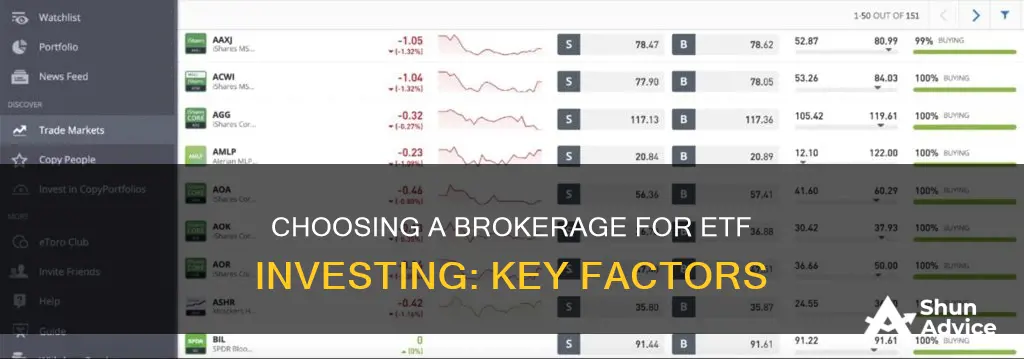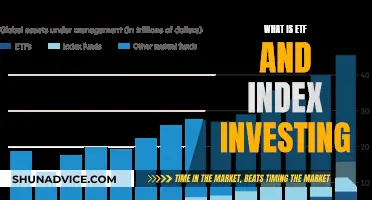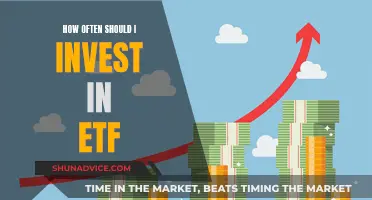
Exchange-traded funds (ETFs) are a popular investment vehicle, providing diversification, attractive returns, and lower risk compared to individual stocks. When choosing a brokerage for ETF investing, there are several factors to consider to ensure you're getting a cost-efficient, diverse offering with robust research tools. Here are some key criteria to help you select the right brokerage for your ETF investments:
- Fees and Commissions: Minimizing fees is crucial as they impact your returns. Look for brokers with low transaction fees, custody/maintenance fees, dividend fees, stock exchange fees, and portfolio transfer fees. Some brokers may also offer lower fees for certain securities or larger portfolios.
- Domicile and Taxes: Consider whether the broker is domiciled in your country or abroad. Foreign brokers may require additional work for tax filings, and they might not withhold taxes you're liable for in your country of residence. Weigh the savings in fees against the extra tax work.
- Account Type and Limits: Understand the account type and its requirements, such as minimum monthly deposits, pre-determined ETF investments, share lending policies, investment limits, and compatibility with pension schemes. Ensure the account aligns with your investment style and risk tolerance.
- ETF and Stock Exchange Availability: Ensure the broker provides access to the ETFs and stock exchanges you're interested in. Some brokers offer a limited selection or have more advantageous pricing for specific exchanges.
- Legal and Regulatory Environment: Choose a broker accredited by the financial authority of its domicile. Understand the measures they have in place to protect your assets in the event of bankruptcy and the investor protection schemes available.
- Currency Support: If you plan to invest in foreign currencies, understand how the broker handles currency conversions and charges. Some brokers may require you to hold separate accounts for each currency.
- Brokerage Service: Decide if you need a discount online broker or a full-service broker that provides investment advice and asset management. If you're a passive index fund investor, you may not need the extra services of a full-service broker.
- Trust and Customer Support: Assess the broker's reputation, reviews, and complaints. Ensure they provide accurate and timely customer support to address any issues that may arise.
- Client Money Handling: Some brokers are regulated and cannot hold (non-invested) client money, instead investing it in money market instruments. Consider if this aligns with your risk profile.
| Characteristics | Values |
|---|---|
| Commission fees | $0 |
| Minimum amount to open a brokerage account | $0 |
| Number of ETFs | 2,500+ |
| Screening tools | Yes |
| Investment ideas | Yes |
| Pre-built ETF portfolios | Yes |
| 24/7 trading | Yes |
| Mobile app | Yes |
| Customer service | Yes |
What You'll Learn
- Consider the brokerage's fund selection and tools for creating a well-diversified portfolio
- Evaluate the costs: account fees, investment choices, customer support, mobile app capabilities
- Research the brokerage's track record and reputation
- Assess your own investment goals, risk tolerance and budget
- Compare different brokerages' features and platforms

Consider the brokerage's fund selection and tools for creating a well-diversified portfolio
When choosing a brokerage to invest in ETFs, it's important to consider the broker's fund selection and tools for creating a well-diversified portfolio. Here are some key points to keep in mind:
Fund Selection:
- Variety of ETFs: Look for a brokerage that offers a wide range of ETFs, including those that cover different asset classes, sectors, and geographic regions. This will allow you to build a diverse portfolio that aligns with your investment goals and risk tolerance.
- Commission-Free ETFs: Many brokerages offer commission-free ETFs, which can help reduce your overall investment costs. Consider choosing a brokerage that provides a large selection of commission-free ETFs.
- Expense Ratios: ETFs charge fees known as expense ratios, which are expressed as a percentage of your investment. Look for ETFs with lower expense ratios to maximize your returns.
- Passive vs. Active ETFs: Passive ETFs, also known as index funds, track a stock index like the S&P 500. Active ETFs, on the other hand, hire portfolio managers to actively invest their money. Passive ETFs generally have lower fees and aim to match the index's performance, while active ETFs aim to beat it.
Tools for Creating a Well-Diversified Portfolio:
- Screening and Research Tools: Some brokerages offer screening tools that allow you to filter ETFs based on various criteria, such as performance, risk factors, ESG indicators, and more. Research tools and analyst ratings can also help you make more informed investment decisions.
- Pre-Built Portfolios: Certain brokerages offer pre-built or model portfolios that are designed based on your investment goals, risk tolerance, and time horizon. These can be a great option if you're looking for a more hands-off approach to building a diversified portfolio.
- Dollar-Cost Averaging: This strategy involves investing a fixed amount of money in your chosen ETFs at regular intervals, regardless of the share price. This helps smooth out market volatility and reduce the risk of investing a large sum at an inopportune time.
- Educational Resources: If you're new to investing, look for a brokerage that provides educational resources, tutorials, and market insights to help you make more informed investment decisions.
Remember that diversification is a key aspect of risk management in investing. By choosing a brokerage with a strong fund selection and robust tools, you can build a well-diversified portfolio that aligns with your investment goals.
ETFs: Invest or Trade?
You may want to see also

Evaluate the costs: account fees, investment choices, customer support, mobile app capabilities
When choosing a brokerage to invest in ETFs, there are several factors to consider regarding costs, investment choices, customer support, and mobile app capabilities.
Account Fees
When it comes to account fees, it is important to evaluate the expense ratio, which is the annual fee charged by the ETF and expressed as a percentage of your investment. For example, a 1% expense ratio means you will be paying $10 in fees for every $1,000 invested. It is generally advisable to look for ETFs with lower expense ratios to maximise returns. Additionally, consider the trading commissions charged by the brokerage. While many brokers offer commission-free ETF trades, some may charge a fee, so it is essential to review the cost structure before making a decision.
Investment Choices
The best brokerages offer a wide range of investment choices, allowing investors to diversify their portfolios. Look for brokers that provide access to various ETFs, including those focusing on different asset classes, sectors, and geographic regions. This diversity ensures that you can build a well-rounded portfolio aligned with your investment goals and risk tolerance.
Customer Support
When evaluating customer support, consider the availability and accessibility of the brokerage's customer service team. Are they easily reachable through multiple channels, such as phone, email, and live chat? Do they provide prompt and knowledgeable responses to your queries? Also, assess the educational resources and investment tools offered by the brokerage. Top brokers often provide extensive research tools, market insights, and educational content to help you make informed investment decisions.
Mobile App Capabilities
In today's fast-paced world, having a mobile app for on-the-go investing is crucial. Evaluate the brokerage's mobile app by considering its ease of use, functionality, and features. Ensure the app allows you to monitor your portfolio, check account balances, execute trades, and access essential investment information seamlessly. A well-designed mobile app can provide you with the flexibility and convenience you need to manage your investments anytime, anywhere.
Brokers and ETFs: Do You Need a Middleman?
You may want to see also

Research the brokerage's track record and reputation
When choosing a brokerage to invest in ETFs, it is important to research the brokerage's track record and reputation. This includes looking into the company's history, reviews from trusted sources, and testimonials from current or previous clients. Here are some key points to consider:
- History and Reputation: Research the brokerage's history, including how long they have been in business and their reputation in the industry. Established companies with a strong track record of successful ETF investments will likely have a better understanding of the market and more resources to offer their clients.
- Performance and Results: Evaluate the brokerage's performance over time. Look for information on their success rate, the average returns generated for their clients, and the level of satisfaction among investors. You can often find this information on their website or through independent review platforms.
- Client Testimonials and Reviews: Seek out testimonials and reviews from current or previous clients. These first-hand accounts can provide valuable insights into the brokerage's level of service, communication, and overall client satisfaction. Look for reviews on trusted websites or consider reaching out to other investors for their feedback.
- Awards and Recognition: Recognitions from reputable organizations or industry awards can indicate a strong track record and positive reputation. Look for awards that specifically highlight their expertise in ETF investing, such as "Best Broker for ETFs" or "Best ETF Platform."
- Regulatory Compliance: Ensure that the brokerage is regulated by relevant financial authorities and complies with industry standards. This provides an extra layer of security and trustworthiness.
- Transparency and Disclosure: Choose a brokerage that is transparent about its fees, investment strategies, and potential risks. Avoid companies that make unrealistic promises or guarantee unusually high returns. A trustworthy brokerage will provide clear and detailed information about their services.
By thoroughly researching the brokerage's track record and reputation, you can make a more informed decision about which firm best aligns with your investment goals and risk tolerance. It is crucial to cross-reference information from multiple sources to ensure an unbiased evaluation.
Betterment's ETF Investment Strategy: How It Works
You may want to see also

Assess your own investment goals, risk tolerance and budget
Before investing in ETFs, it's important to assess your own investment goals, risk tolerance, and budget. Here are some key considerations:
- Investment goals: Are you investing for the short-term or long-term? What are your financial objectives? Do you want to focus on capital appreciation, income generation, or a combination of both? Clearly defining your investment goals will help you choose ETFs that align with your objectives.
- Risk tolerance: ETFs are generally considered lower-risk investments due to their diversification. However, different types of ETFs carry varying levels of risk. For example, leveraged and inverse ETFs are riskier than traditional ETFs. Assess your risk tolerance to determine what types of ETFs are suitable for your portfolio.
- Budget: Consider your investment budget, including the amount you can allocate to purchasing ETFs and any associated fees and expenses. ETFs have expense ratios, which represent the annual fees deducted from your investment. Look for ETFs with lower expense ratios to maximize your returns. Additionally, some brokers may charge commissions or other fees for ETF trades, so be sure to factor those costs into your budget.
- Time horizon: Think about your investment time horizon. If you're investing for the long-term, you may be more willing to tolerate short-term fluctuations in the market. On the other hand, if you have a shorter time horizon, you may want to focus on more conservative investments to protect your capital.
- Diversification: ETFs offer built-in diversification by holding a basket of securities. However, you can further diversify your portfolio by investing in different types of ETFs, such as those focusing on various sectors, asset classes, or geographic regions. Diversification can help reduce risk and improve the overall performance of your portfolio.
- Tax implications: Be mindful of the tax implications of investing in ETFs. Any gains from selling ETFs will typically be subject to capital gains taxes. Additionally, ETFs may generate dividend income, which can also be taxable. Consider the tax consequences when deciding whether to invest in a taxable brokerage account or a tax-advantaged account like an IRA.
Ally Invest: Fee-Free ETFs and Their Benefits
You may want to see also

Compare different brokerages' features and platforms
When comparing different brokerages' features and platforms, it is important to consider a few key factors. Firstly, look at the range of ETFs offered by each brokerage. Some brokerages may offer a wider selection of ETFs, including those that track broad market indexes like the S&P 500, while others may have a more limited selection. It is also important to consider the fees and commissions charged by the brokerage. Many brokerages now offer commission-free ETF trades, but there may be other fees associated with managing your investments. Additionally, look at the research and screening tools offered by the brokerage. These tools can help you filter and compare ETFs based on various criteria such as expense ratios, performance, holdings, and trading volume. Also, consider the user-friendliness and functionality of the brokerage's platform, especially if you are a new investor. Some platforms may offer extensive educational resources and tools to help you make informed investment decisions. Finally, consider the customer support provided by the brokerage. This includes the availability of phone, email, or chat support, as well as the responsiveness and knowledgeability of the support team. By comparing these features across different brokerages, you can make an informed decision about which brokerage best suits your investment needs and goals.
M1 Finance: Invest in ETFs with Ease
You may want to see also
Frequently asked questions
Some of the best online brokers for ETFs include Fidelity, Interactive Brokers, Charles Schwab, Vanguard, E*TRADE, Firstrade, Merrill Edge, and Ally Invest.
Here are some factors to consider:
- Cost-efficiency: Look for brokers that offer a wide range of commission-free ETFs and have minimal fees associated with trading and account maintenance.
- Variety of ETF offerings: Choose a platform that offers a broad spectrum of ETFs covering different asset classes, sectors, and geographic regions to build a well-rounded portfolio.
- Advanced research tools: Select a brokerage that provides comprehensive research tools, ETF screeners, and real-time market data to help you make informed investment decisions.
ETFs offer several benefits, including:
- Diversification: ETFs provide exposure to a diverse range of stocks, bonds, and other assets, helping to reduce risk in your portfolio.
- Low cost: ETFs are typically low-cost investment options, with lower expense ratios and management fees compared to mutual funds.
- Flexibility: ETFs trade like stocks on major exchanges, allowing you to buy and sell throughout the trading day.
- Tax efficiency: ETFs are generally more tax-efficient than mutual funds, as you may only pay capital gains taxes when you sell the investment.
Here are some potential disadvantages to consider:
- Commissions: While many brokers offer commission-free ETF trades, some may still charge commissions or other fees.
- Liquidity: ETFs that are not frequently traded may be harder to sell, and you will be subject to market prices when selling.
- Fund closure: There is a risk that an ETF may close down, forcing you to sell your holdings earlier than intended or reinvest elsewhere.







